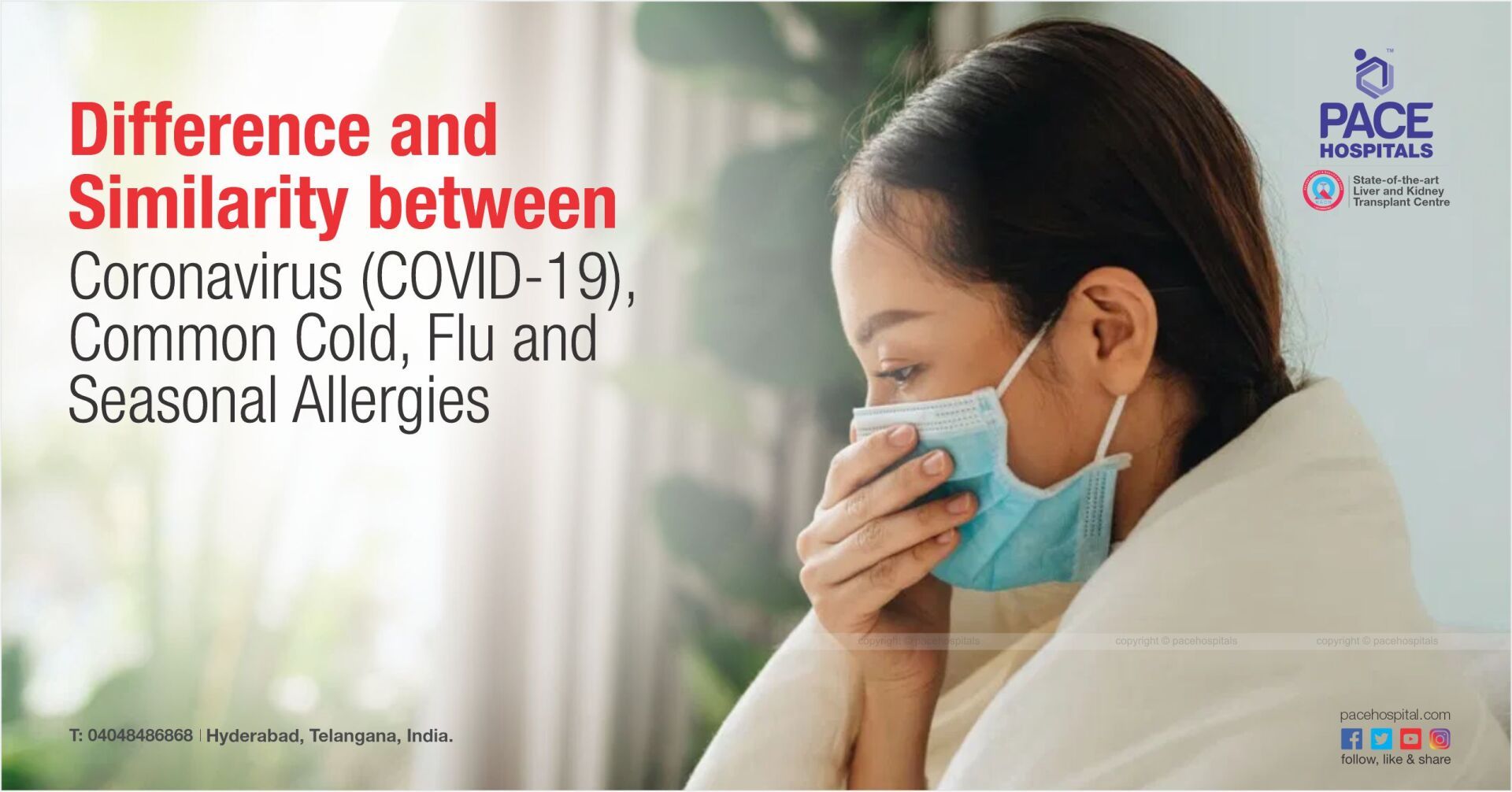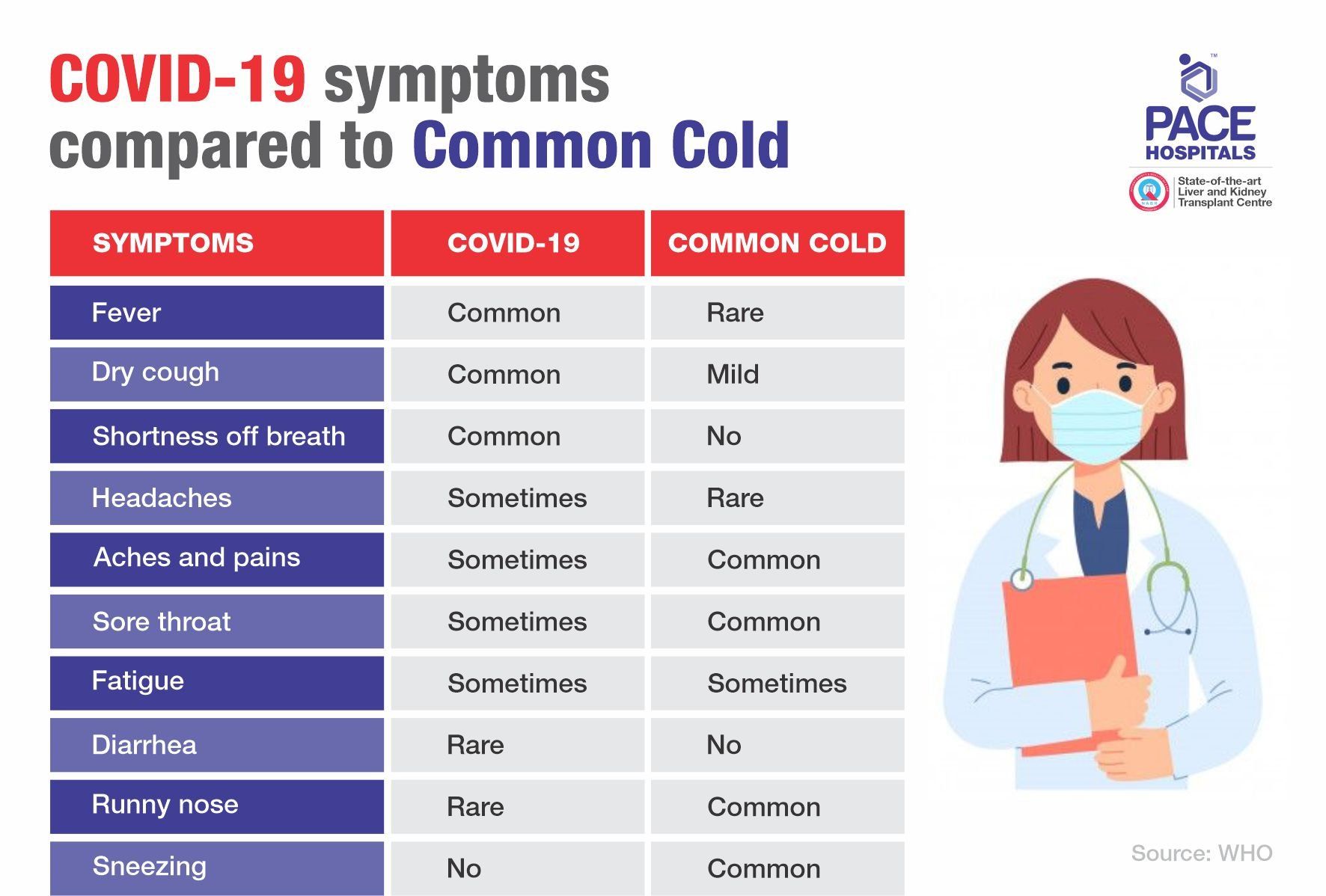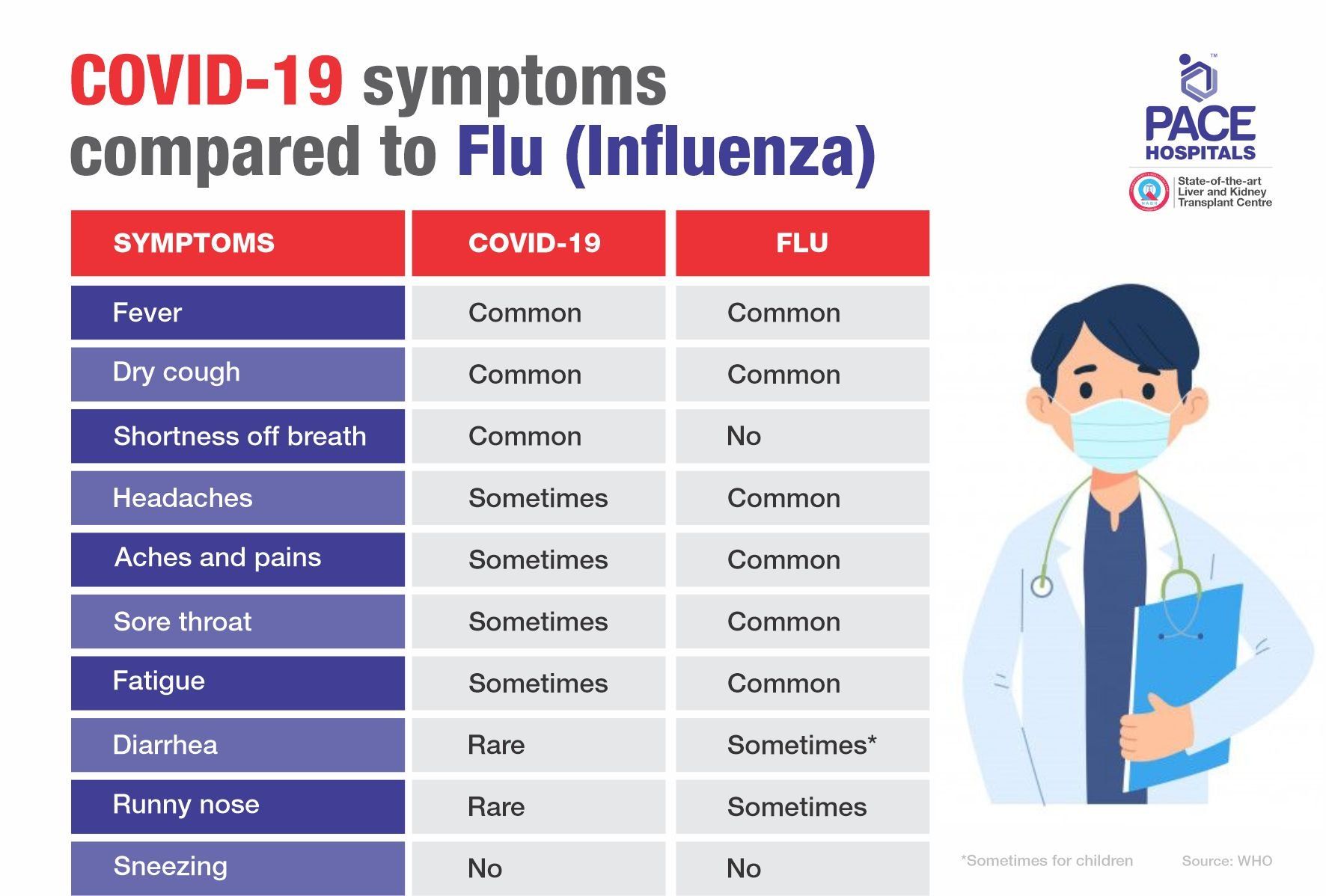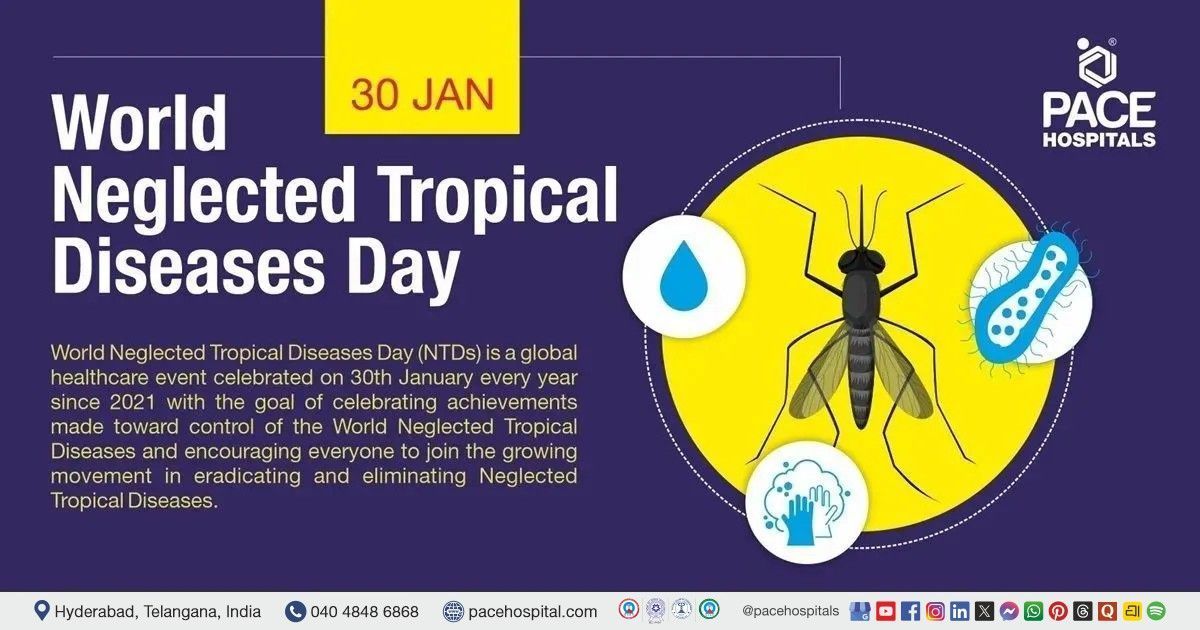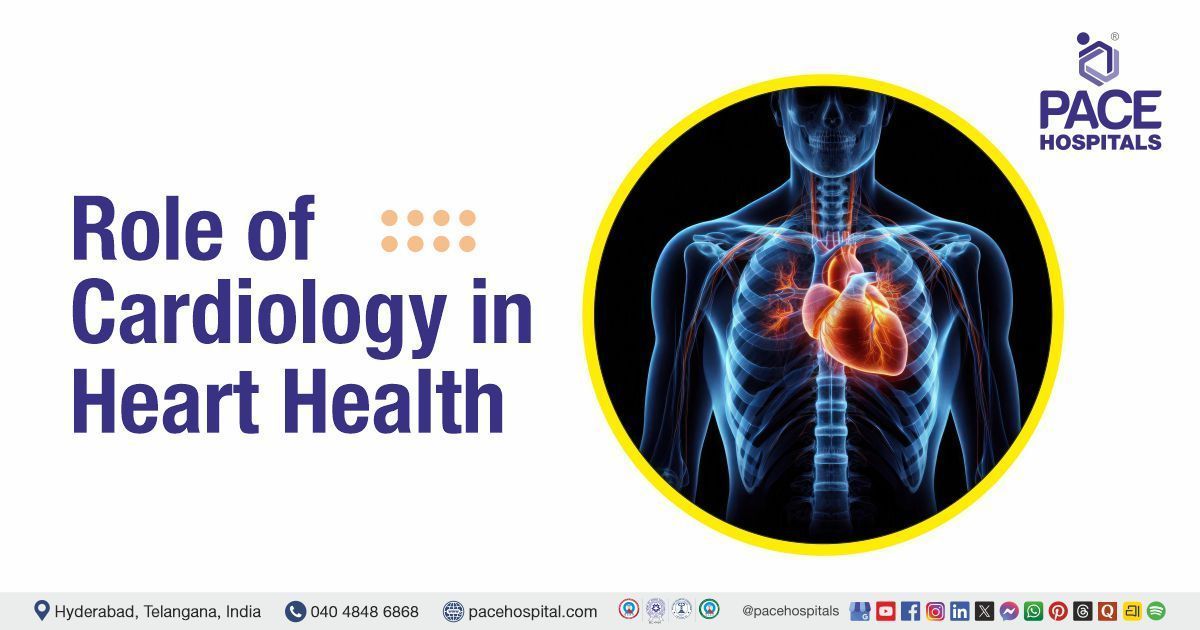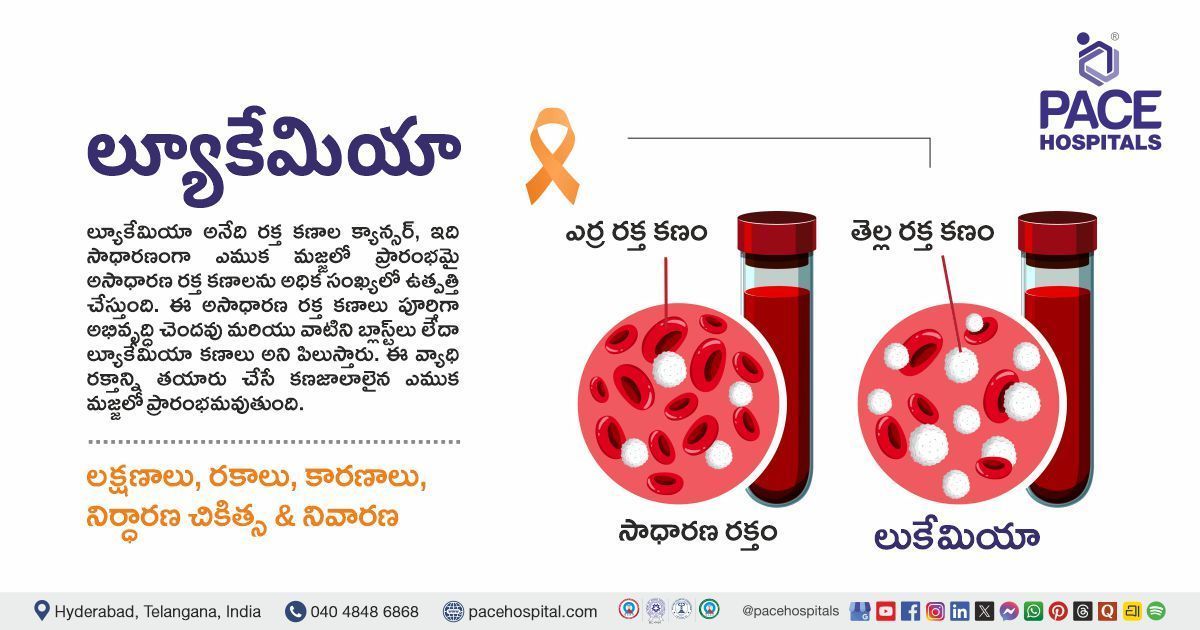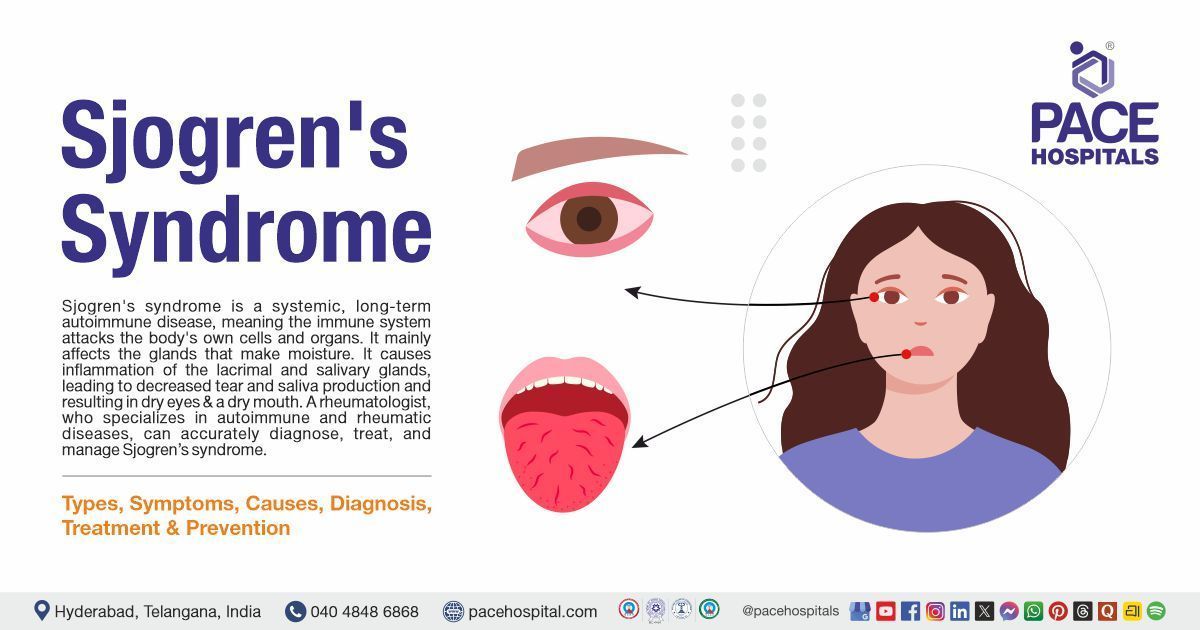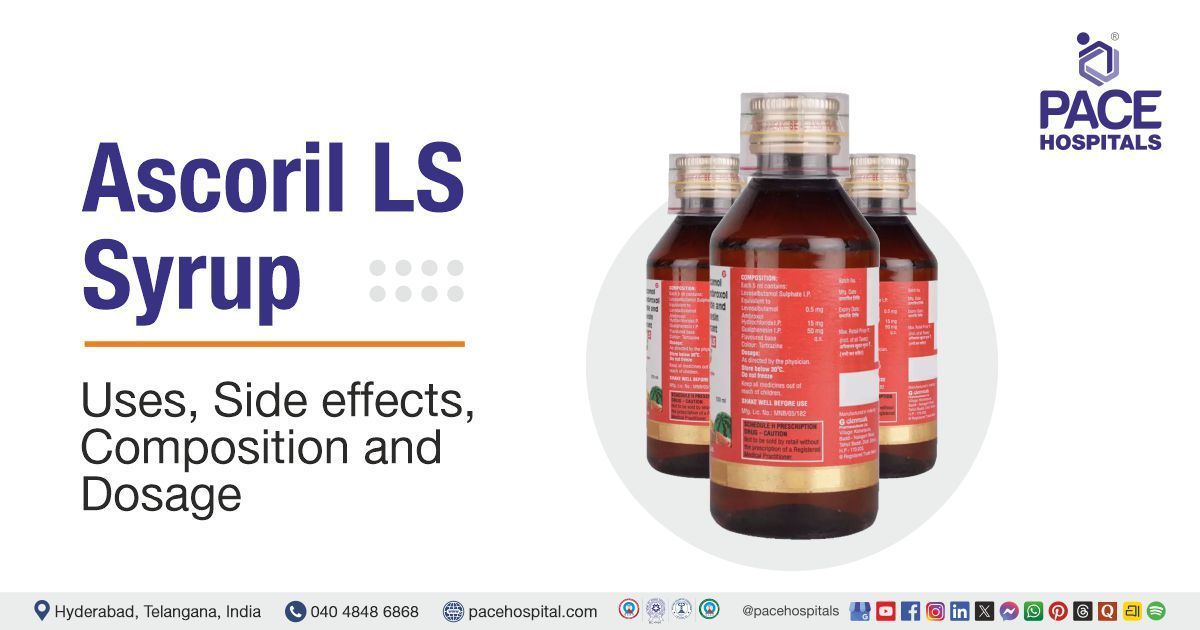Coronavirus vs Common Cold vs Flu vs Seasonal Allergies Symptoms: Difference and Similarity
PACE Hospitals
Some of the typical common key symptoms of coronavirus are fever, tiredness, cough, shortness of breath and loss of (or new change to) your sense of smell and / or taste. But there's still much confusion about similarities and differences between Coronavirus (COVID-19), common cold, flu (seasonal influenza), and seasonal allergies.
All these diseases cause upper respiratory illness in humans. These all are contagious and can spread easily from person to person. They cause some similar symptoms and difficult to distinguish from each other.
Coronavirus disease (COVID-19) caused by SARS-CoV-2 (Severe acute respiratory syndrome coronavirus 2). It was originated at Wuhan, China in early December 2019 has rapidly widespread with confirmed cases in almost every country across the world and has become a new global pandemic.
Some of the coronavirus symptoms are as follows:
- Fever (a temperature above 100 °F) lasting a few days to many
- Difficulty breathing or shortness of breath
- Sore throat or Runny nose
- Dry, continuous coughing
- Tiredness or fatigue causing a 16 to 20 hours sleep a day
- A change or loss of smell and taste senses, loss of appetite
- Nausea or diarrhea
- Aches and pains, headaches
Life-threatening / emergency COVID-19 symptoms that require immediate medical attention:
- Extreme difficulty breathing (such as gasping for air, being unable to talk without catching your breath, severe wheezing, nostrils flaring)
- Pale, gray, or blue-colored skin, lips, or nail beds, depending on skin tone
- Unconscious or very difficult to wake up
- Severe and constant pain or pressure in the chest
- New disorientation (acting confused)
- New or worsening seizures
- Slurred speech or difficulty speaking (new or worsening)
- Dehydration (dry lips and mouth, not urinating much, sunken eyes)
- Signs of low blood pressure (too weak to stand, dizziness, lightheaded, feeling cold, pale, clammy skin)
Generally it will take 10 to 14 days to recover fully, and sometimes more. Mild to moderate case of COVID-19 will run in about two weeks. According to a World Health Organization (WHO), 70% to 80% of COVID infected cases manifested mild to moderate symptoms.
What is the difference between common cold and coronavirus?
Common cold is also a respiratory illness like COVID-19 and both are contagious. Common cold caused by rhinovirus, it is the most common viral infectious agent in humans. It is usually mild, with the following symptoms:
- Runny or stuffy nose
- Sore throat
- Cough
- Muscle pains and aches
- Tiredness
- Sneezing
- Watery eyes
- Fever (rarely)
- Headaches (rarely)
Coronavirus and Cold two types of illnesses have similar symptoms, it can be difficult to tell the difference between them based on symptoms alone. As per recent studies coronaviruses account for 10% to 30% of upper respiratory infections in adults.
Common cold symptoms may last up to 7 to 10 days and our body’s immune system fight the virus to get rid of it. Seasonal changes in relative humidity also may affect the prevalence of colds.
- Runny or stuffy nose and a sore throat symptoms are typically the first signs of a common cold. These symptoms are less common with coronavirus.
- Fever symptom is not common in cold against common in COVID-19.
- Common cold generally do not result in change in or loss of taste or smell, whereas COVID-19 can have it.
- Colds generally do not result in serious health problems, whereas coronavirus can have very serious health complications associated with it.
What is the difference between coronavirus and flu (seasonal influenza)?
Flu is also a respiratory illness like COVID-19 and both are contagious in nature. Flu caused by influenza A and B viruses that infect the nose, throat, and sometimes the lungs. It is usually having the following symptoms:
- Extreme exhausted or Tiredness
- Shortness of breath or difficulty breathing
- Headaches
- Body pains and aches
- Runny or stuffy nose
- Sore throat
- Cough
- Fever with chills (not everyone will have it)
- Nausea and vomiting (rarely in adults but common in children)
- Diarrhea (rarely in adults but common in children)
Most of the people who get infected by flu develop symptoms within 4 days of infection, and those symptoms usually resolve within 14 days. Flu can cause serious and even life-threatening problems and complications like coronavirus.
Vaccination can help to prevent the flu, reduce the risk of getting severely affect with flu. People 65 years and older, people with asthma, chronic lung disease, diabetes, neuro disorder, blood disorders, heart disease, kidney disease, liver disease, chronic medical conditions, weakened immune system are at high risk of developing serious complications from flu compared with young, healthy adults.
Coronavirus and Flu two types of serious illnesses have almost similar symptoms, it can be difficult to tell the difference between them based on symptoms alone.
- Flu symptoms usually appear about 1 to 4 days whereas COVID-19 symptoms can be more gradual generally appear 2 to 14 days after exposure to virus.
- Flu usually causes a mild to severe symptoms, whereas COVID-19 cause more serious illnesses. COVID-19 patients are usually having dry coughs, persistent and that can cause shortness of breath.
- Most people with flu are contagious for about 1 day before they show symptoms and with COVID-19 someone can spread the virus is still under investigation. It’s possible for people with SARS-CoV-2 to spread the virus for about 2 days before experiencing signs or symptoms and remain contagious for at least 10 days after signs or symptoms first appeared.
- Flu generally do not result in change in or loss of taste or smell whereas coronavirus patients can have it.

What is the difference between coronavirus and seasonal allergies?
Seasonal allergies rhinitis or Hay fever, are allergy symptoms that happen during certain times of the year, usually when your immune system overreacts to an outdoor molds or allergen or pollen, that triggers an allergic response. Your immune system responds to that substance, or allergen, by releasing chemicals into your bloodstream. Those chemicals produce the symptoms of an allergic reaction. Depending on your allergy triggers and where you live, you may experience hay fever in more than one season.
Seasonal allergies can cause mild to severe symptoms that include:
- Runny or stuffy nose
- Itchy nose, throat, sinuses
- Ear congestion
- Itchy and watery eyes
- Sneezing
- Cough (rarely)
- Shortness of breath (rarely)
- Fatigue (rarely)
- Headaches (rarely)
Seasonal allergies are easy to identify because the pattern of symptoms returns from year to year following exposure to an allergen or pollen. Seasonal allergies generally do not result in any serious health problems, whereas COVID-19 can have very serious health complications associated with it.
If your signs or symptoms are becoming severe, seek medical attention for COVID-19 testing and monitor your symptoms day by day. Taking precautions and preventive measures can help you stay healthy.
Share on
Request an appointment
Fill in the appointment form or call us instantly to book a confirmed appointment with our super specialist at 04048486868

